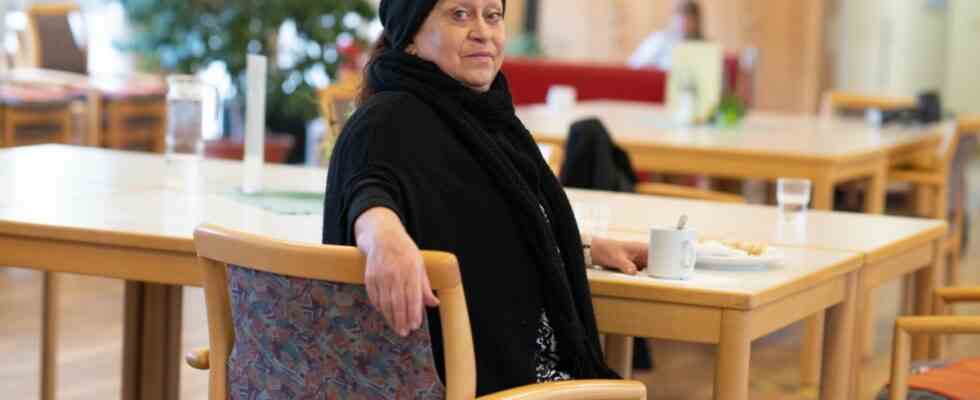First she noticed how much she was sweating. When Angelika S. went to the doctor in 2001, he didn’t even have to examine her to know what was wrong with her. He saw it in her face: her eyes were bulging, her tongue was swollen, her nose was enlarged. The diagnosis was acromegaly, i.e. an overproduction of growth hormones caused by a brain tumor.
It is a rare disease. Out of one million people, three to four people are diagnosed with the disease every year. For Angelika S., the illness initially had the following effect: “Everything has spread, of course it was terribly painful,” she says. She is a small, well-groomed woman, 67 years old, dressed all in black. She has tied her long, dark hair into a ponytail with a wool hairband. Matching eyeshadow glitters behind her silver-colored glasses.
The pensioner is sitting at a table in the back room of the ASZ Schwabing-West, a Caritas service center for the elderly. She eats lunch here in the large lounge three times a week. Angelika S. does this to make contacts because she lives alone. But mainly for financial reasons. She receives a monthly pension of 800 euros, electricity and gas alone cost 200 euros. There is little left to live on.
When Angelika S. was diagnosed with the tumor, she was still working full-time. As a saleswoman, she had to stand almost all day, although her calves hurt and her shoes no longer fit. After several therapy attempts, she finally underwent surgery in 2002 and received a limited pension. To avoid falling into the poverty trap, she returned to her job two years later. First full-time, later as a part-time job. Because the complaints remained, the tumor could not be completely removed.
She was terminated, reason: “so that customers don’t see how you torture yourself”
To this day, she receives an injection every month to stop the growth of the tumor. She used to wear a size 36 dress, but is now a size 46, a side effect of the cortisone medication she has to take. Angelika S. repeatedly suffers from depression, is chronically tired and has pain all over her body. “I worked until I was exhausted. Sometimes I went to work unwashed and without my hair done,” she says. Much of the money went to treating the symptoms. In 2019, the company terminated her with the verbal justification “so that customers don’t see how you torture yourself”.
But Angelika S. can’t do much with the free time she has now. She has no money for activities. But she also lacks the strength. She is therefore only rarely able to do her voluntary work with dementia patients. If she goes on one of the few day trips for twelve euros, she’ll be exhausted by the time the bus arrives at her destination. In the past, says Angelika S., she liked to ride her bike, but now she lacks the sense of balance and her knees hurt. Instead, she would like to go swimming, for example in Bad Füssing. Or take a yoga class. To move more, to lose weight. But above all, she says, “so that the joy of life returns”.
Here’s how you can donate
Advent calendar for good works from the Süddeutsche Zeitung eV Stadtsparkasse Munich, IBAN DE 86 7015 0000 0000 6007 00, BIC SSKMDEMMXXX.
Donations to the SZ Advent calendar are tax deductible. For transfers of more than 300 euros, we will send you a donation receipt. www.sz-adventskalender.de

